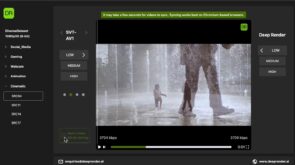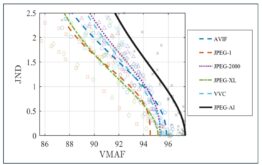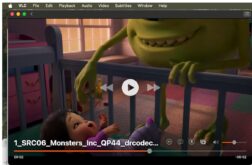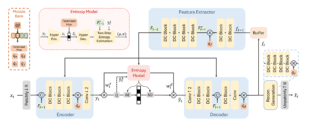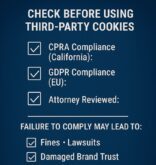Last week, VideoLAN released VLC 2.1.1, which incorporates HEVC and VCP9 playback on many of the multiple platforms supported by the player, which includes Windows, Mac OS, iOS, Android, FreeBSD, Solaris, Ubuntu, Mint, and multiple flavors of Linux. I tested HEVC playback on Windows and Mac, which works very well. There’s also an interesting intellectual property-related side of the story which I describe below.
By way of background, the VLC player is an open source player that’s widely used by most video developers and producers, and by many computer-savvy consumers. In addition to extensive platform support, the player also supports an exceptionally broad range of codecs, container formats, and delivery protocols for a range of media types. Thus HEVC is a natural, evolutionary step.
To be fair, VIdeoLAN wasn’t the first to release a free player with HEVC playback; that honor goes to Rovi, which launched DivX 10 with HEVC encode and decode in September. As mentioned at the time, Rovi’s goal with DivX 10 was to “help fuel HEVC content availability and generate demand for playback support to be integrated into consumer electronic devices.” With an estimated installed base of over 100 million users worldwide, the VLC player can further raise the awareness of and increase the demand for HEVC-encoded content, at least for file-based, rather than streaming playback.
For browser-based playback, since HEVC decode isn’t yet integrated into Flash, HTLM5, or the iOS/Android operating systems, streaming HEVC-encoded content is a non-starter. One potential reason for these delays is the lack of a defined royalty policy. While we don’t know what types of uses will give rise to HEVC royalties, or the costs, it’s expected that integrating HEVC playback into browsers, plug-ins and other players involve a royalty charge, just like H.264 does today.
Rovi, through its subsidiary MainConcept, is a current H.264 licensee, and as a public company, it’s probably safe to assume that they plan to honor whatever HEVC royalties are established. What’s VideoLAN’s plan?
According to an article in CNET, VideoLAN does not plan to pay HEVC royalties. As stated in the article, “European and French law does not consider ‘software-only’ patents as valid,” said Jean-Baptiste Kempf, president of the VideoLAN Organization, told CNET. “As we are doing software only, not hardware, and we don’t make money, we don’t license those.”
I sent the quote to a contact at MPEG LA, and asked what they thought of Kempt’s assertions. The answer was “no comment.” While VideoLAN has shipped VLC player with H.264 decode for many years without paying H.264-related royalties, there’s no guarantee that MPEG LA, which expects to announce an HEVC patent pool soon, will take the same approach with HEVC.
Patent issues aside, HEVC playback within the VLC player can only accelerate demand for HEVC content and browser-based playback, which is a positive for all companies involved in content encoding and delivery.
 Streaming Learning Center Where Streaming Professionals Learn to Excel
Streaming Learning Center Where Streaming Professionals Learn to Excel

